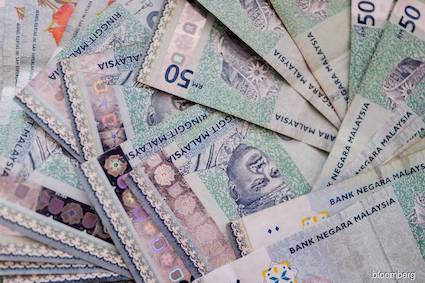Fitch unit: Ringgit to weaken to RM4.33 against USD by 2020 due to political uncertainties

(MMO) – The ringgit is expected to depreciate to RM4.33 against the greenback by 2020 due to uncertainty in the political sphere, said Fitch Solutions Macro Research (FSMR), a unit of Fitch Rating, in a statement today.
Its bearish view is premised on its concerns on the planned handover of the prime minister’s post from Tun Dr Mahathir Mohamad to Parti Keadilan Rakyat president Datuk Seri President Anwar Ibrahim in 2 years time.
READ MORE HERE: Mahathir’s Greatest Worry If He Dies Next Year: His Children
Over the longer-term, FSMR remains moderately bearish on the rInggit beyond 2019, forecasting a marginally weaker average exchange rate of MYR4.33/USD in 2020, as the planned succession might not be completed in the next 24 months, resulting in uncertainties.
It said regardless of how competently the transition from Mahathir to Anwar is managed, Malaysia will still see two different PMs in roughly as many years, unprecedented for a country where the shortest tenure so far for a PM is five years and 114 days.
This is likely to continue driving sentiment against the unit beyond H119, it said.
The ringgit has depreciated 4.5 per cent to MYR4.17/USD as of December 3, compared to MYR3.99/USD on September 28 and FSMR expects the ringgit to average 2018 at around the MYR4.00/USD level, with the year-to-date average coming in at MYR4.02/USD as of December 3.
“We remain bearish on the ringgit n H119, as sentiment is likely to remain negative on policy uncertainties, which could be further exacerbated if emerging markets (EM) were to remain under pressure,” said FSMR.
The local currency has been displaying a dissociation with both real and nominal bond yields since the elections on May 9. Real yields have had a strong run in H218, improving on the back of subdued inflation, increasing to 3.5 per cent on November 2 from 2.33 per cent on May 11.
However, the unit has depreciated by 5.3 per cent in the same period to MYR4.16/USD from MYR3.95/USD.
It said this dissociation is attributable to the negative sentiment towards the currency engendered by political and policy uncertainty after the long ruling Barisan Nasional coalition was defeated by the then opposition Pakatan Harapan (PH) coalition at the polls.
This was subsequently exacerbated by the tit-for-tat tariffs imposed by the US and China on each other as part of their ongoing trade dispute. Indeed, the unit displays a positive correlation with the EM (Emerging Markets) complex, which has been underperforming developed markets (DM).
The less hawkish tone of US Federal Reserve Chairman Jerome Powell on November 28 characterising the current Fed Funds Rate band of 2.00-2.25 per cent as being close to ‘neutral’ is likely to further improve sentiment towards EMs.
However, it remains concerned that markets may have over-reacted to this slight change of tone, as a re-pricing of future Fed hikes could be painful for EMs. Meanwhile, it does not expect US-China trade tensions to ease substantially in the short to medium term horizon.
According to FSMR, political and policy uncertainty looks set to remain a key issue in H119. Dr Mahathir has said that he is unhappy with the performance of his cabinet, according to a report on September 7 by Channel News Asia (CNA).
This set off speculation that he is considering reshuffling the cabinet. However, CNA later reported on November 15 a statement by Mahathir saying that while he is not keen to reshuffle his cabinet just six months after its formation, the PH coalition ‘might want, might insist’ that he does so, in which case he would consider such a course.
On the political side, FSMR is assuming a benign transition from Dr Mahathir to Anwar and that identity politics remain under control, failing which the ringgit would likely weaken significantly.
On the economic side, its forecasts incorporate an average Brent crude price of USD75/bbl in 2019, which would support the MYR as 15.3 per cent of total exports in 2017 were in the Oil & Gas category. It also said that its forecast was subject to significant downside risks, such as an escalation in the US-China trade dispute.

